Airfare site Skiplagged.com has become pretty popular with many consumers, and is most well-known for helping people engage in hidden city ticketing. American Airlines is now the latest airline to sue the website. I find this to be a fascinating lawsuit, and I’m curious to hear what OMAAT readers think.
In this post:
The basics of Skiplagged and hidden city ticketing
Let’s start with some context. Skiplagged.com is an airfare site that helps people save money on airline tickets by violating the published contract of carriage of most airlines.
Specifically, the website helps customers find hidden city ticketing opportunities, and then charges a service fee to direct people to booking these. For those not familiar with the concept of hidden city ticketing, the idea is that if you need to fly from Point A to Point B, you might actually pay less by booking a ticket from Point A to Point C via Point B, and then you just skip the second segment.
This is not illegal, but it does violate the rules of most airline contracts of carriage, so there are some important warnings to be aware of. This only works if you’re not checking bags, things could get messy during irregular operations, and you could get banned from a carrier’s frequent flyer program over this. For example, see this recent post I wrote about a teen who was interrogated and then banned by American for hidden city ticketing.
Just to give a real life example, say you want to travel from Tampa to Charlotte, and search that on Skiplagged.com.

You’ll see all kinds of itineraries, and the cheapest options will be ones that actually show extra connections.

When you select the itinerary, you’ll see “Hidden-City” listed, meaning you’re engaging in that practice. Rather than booking a nonstop, you’re booking a less expensive itinerary that connects to New Orleans, and you just skip the second flight.
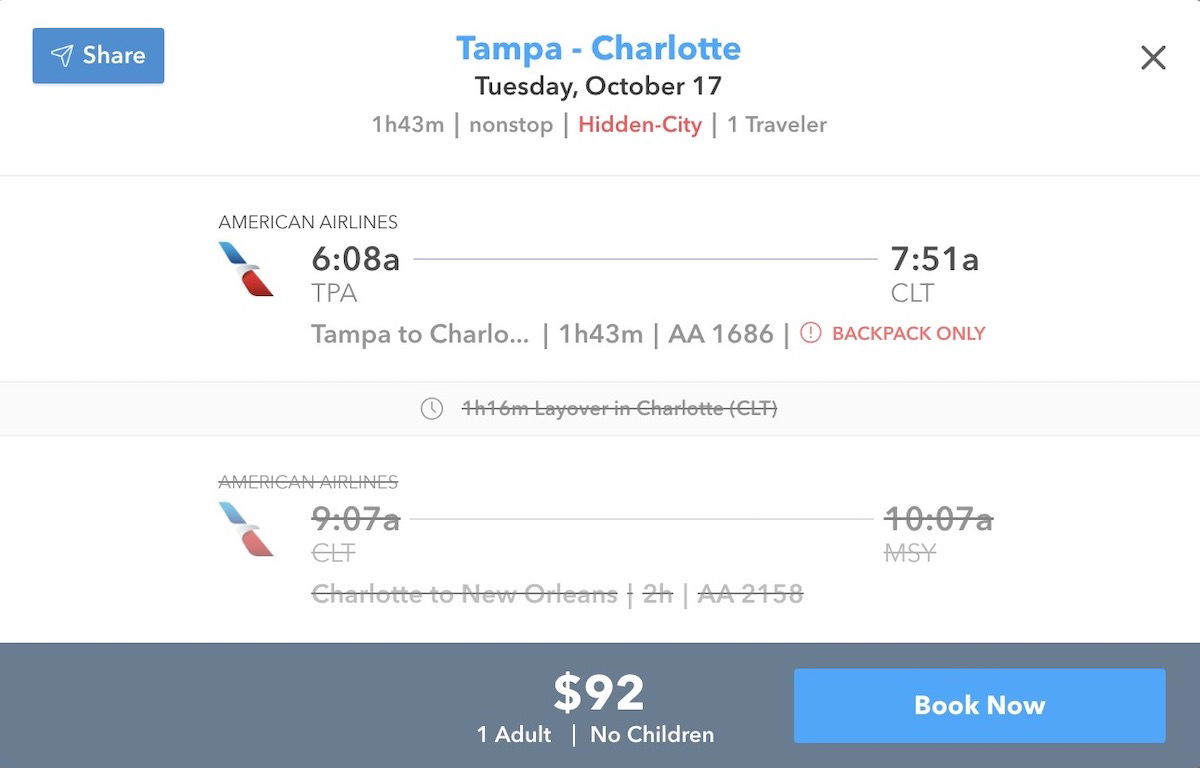
If you choose that itinerary, Skiplagged.com warns you of the risks of this.
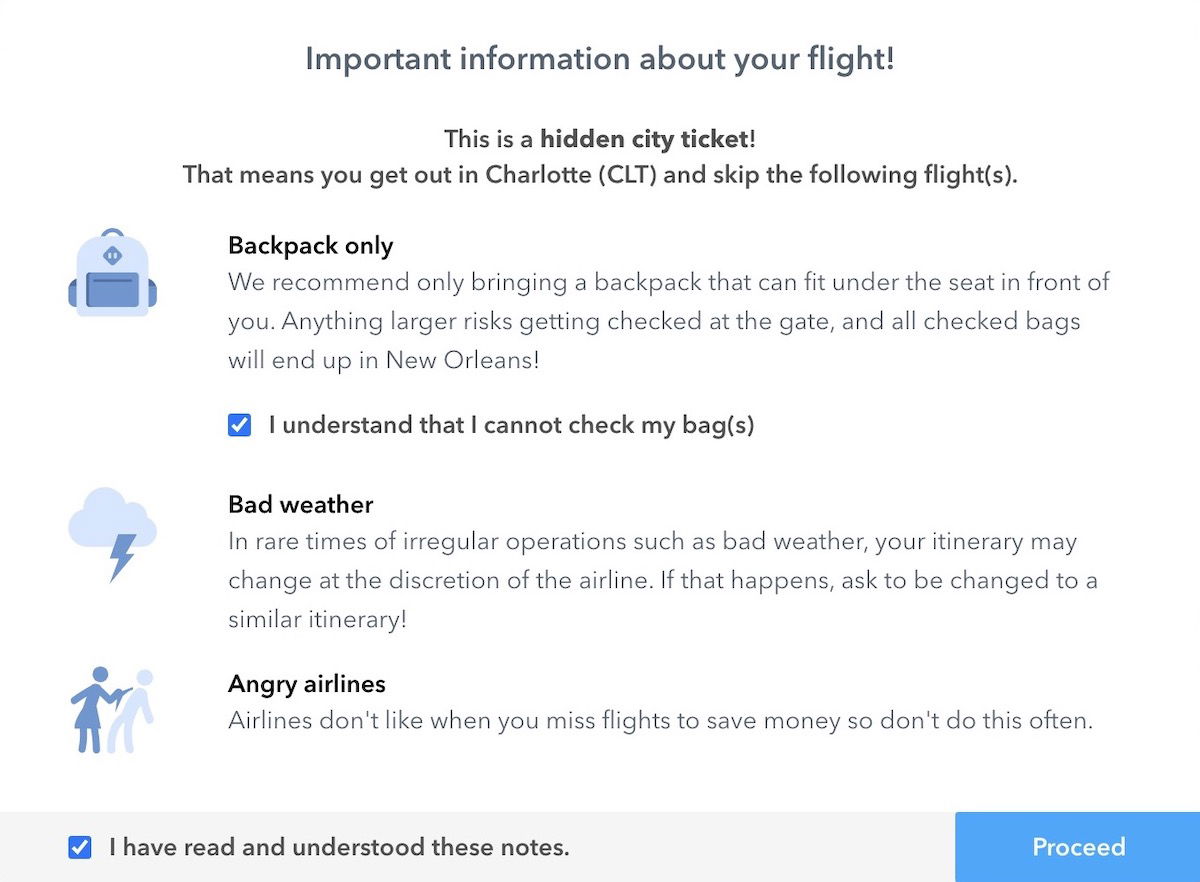
Skiplagged.com then books the ticket directly through American Airlines’ website using automated technology, and charges a service fee. Keep in mind you could always use Skiplagged.com to research options, and then go directly to aa.com to book that itinerary without the service fee.
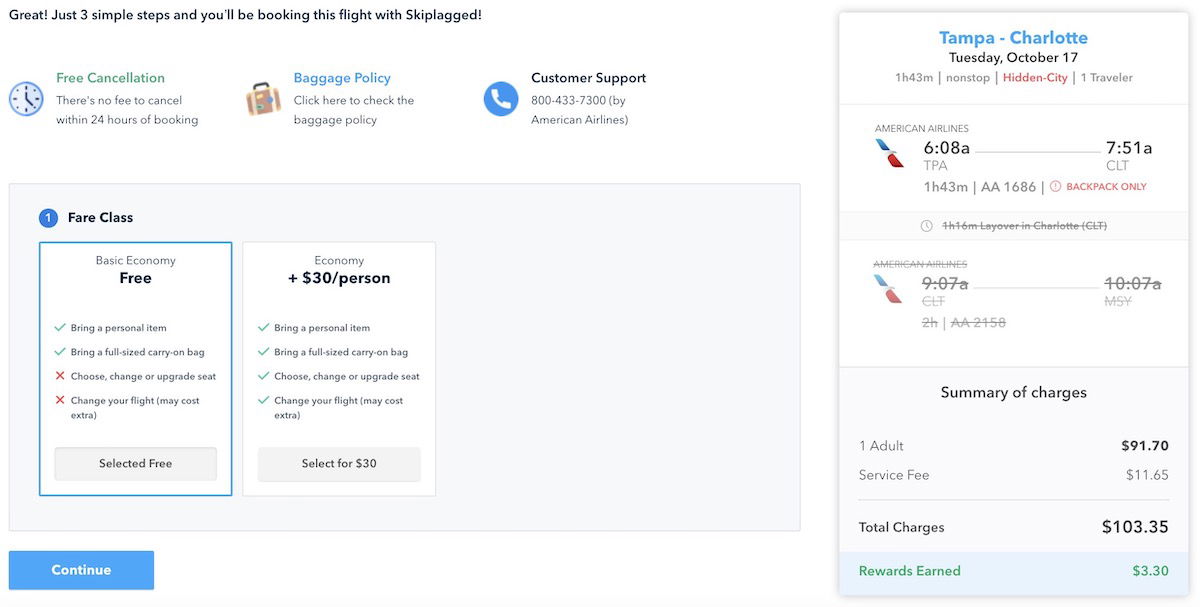
Why American Airlines is suing Skiplagged
American Airlines has filed a lawsuit against Skiplagged.com in a Texas federal court. American Arlines is seeking injunctive relief to prevent the site from using American’s logos, or publishing any information about its flights, as well as damages. The airline is claiming that Skiplagged’s actions constitute tortious interference, breach of the aa.com terms of use, trademark infringement, and copyright infringement.
Let me highlight a few of the key points in the lawsuit, according to American:
- Skiplagged has never had an agency agreement with American and has never had any authority, whatsoever, to sell tickets for American flights. Indeed, Skiplagged developed methods to illegally obtain access to tickets and offer them to consumers – tickets which are at risk for immediate invalidation – because only an agent of American has the legal authority to form a valid contract between a consumer and American.
- Skiplagged deceives the public into believing that, even though it has no authority to form and issue a contract on American’s behalf, somehow it can still issue a completely valid ticket. It cannot. Every “ticket” issued by Skiplagged is at risk of being invalidated.
- Skiplagged also deceives the public into believing that the American fares it displays will give the consumer access to some kind of secret “loophole.” But many of the fares displayed on Skiplagged’s website are higher than what the consumer would pay if they simply booked a ticket on American’s website or through an actual authorized agent of American. It is the classic bait and switch: draw consumers in with the promise of secret fares, and instead sell the consumer a ticket at a higher price.
- Skiplagged knows any ticket it issues is at risk for invalidation, and that American could simply cancel the ticket if detected, so Skiplagged hides its activity. It also tells its customers to hide it from American. Skiplagged does this by purchasing tickets on the AA.com website while pretending to be a consumer, in violation of the AA.com terms of use; by inducing agents of American to breach their agency agreements with American; and by misusing American’s trademarks to falsely imply that it is American’s authorized agent. On information and belief, Skiplagged employs other methods of hiding its activity that American is currently investigating.
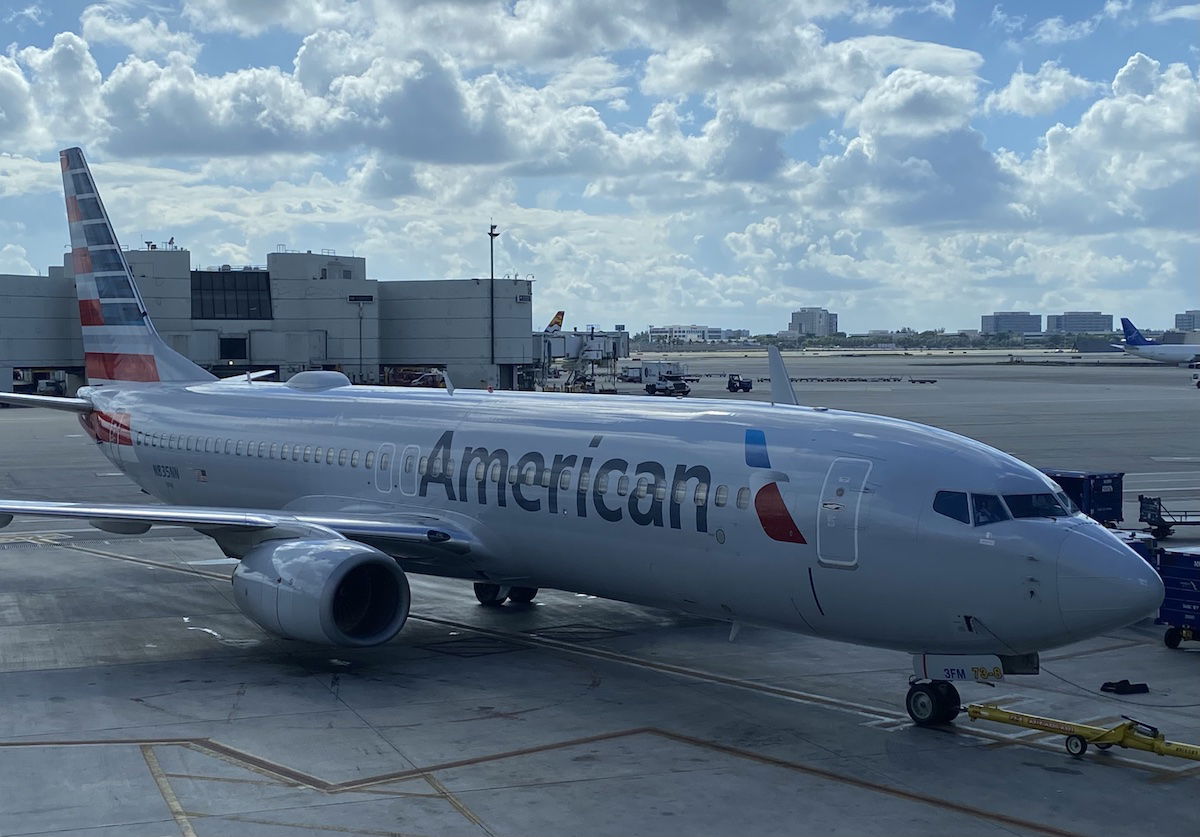
My take on American’s lawsuit against Skiplagged
American’s request to have its logo not be used by Skiplagged seems wholly reasonable, since the two companies don’t have any sort of a business agreement.
American’s much bigger issue, though, seems to be with the way that Skiplagged sells American Airlines tickets. How does Skiplagged issue American Airlines tickets? The website collects all your information, then it has automated scripts that allow it to use American’s website directly to book the ticket, while pocketing the service fee that it charges consumers. So Skiplagged is booking tickets directly on aa.com on behalf of consumers.
The problem with this is that American prohibits the use of aa.com for any commercial purpose without American’s express authorization. Admittedly this is really broad, and American only seems to want to enforce this at its discretion.
I mean, not to get myself in trouble, but if I search for award availability on aa.com for personal reasons, but then find some good options and write about it on the blog, didn’t I technically use American’s website for commercial purposes? That seems like a bold argument to make.
If American wants to stop Skiplagged, why doesn’t it make its website terms of use more explicit? The airline could just ban any entity it doesn’t have a business relationship with from using scripts to book tickets on aa.com, no?
I find it strange how American makes the claim that Skiplagged is engaging in a “bait and switch” by charging consumers more for airfare. So basically American is complaining that Skiplagged is charging a service fee and charging consumers more. Never mind that American charges much higher fares to begin with for many of the flights that people are booking through Skiplagged. That seems like an unnecessary distraction for the purposes of this lawsuit, no?
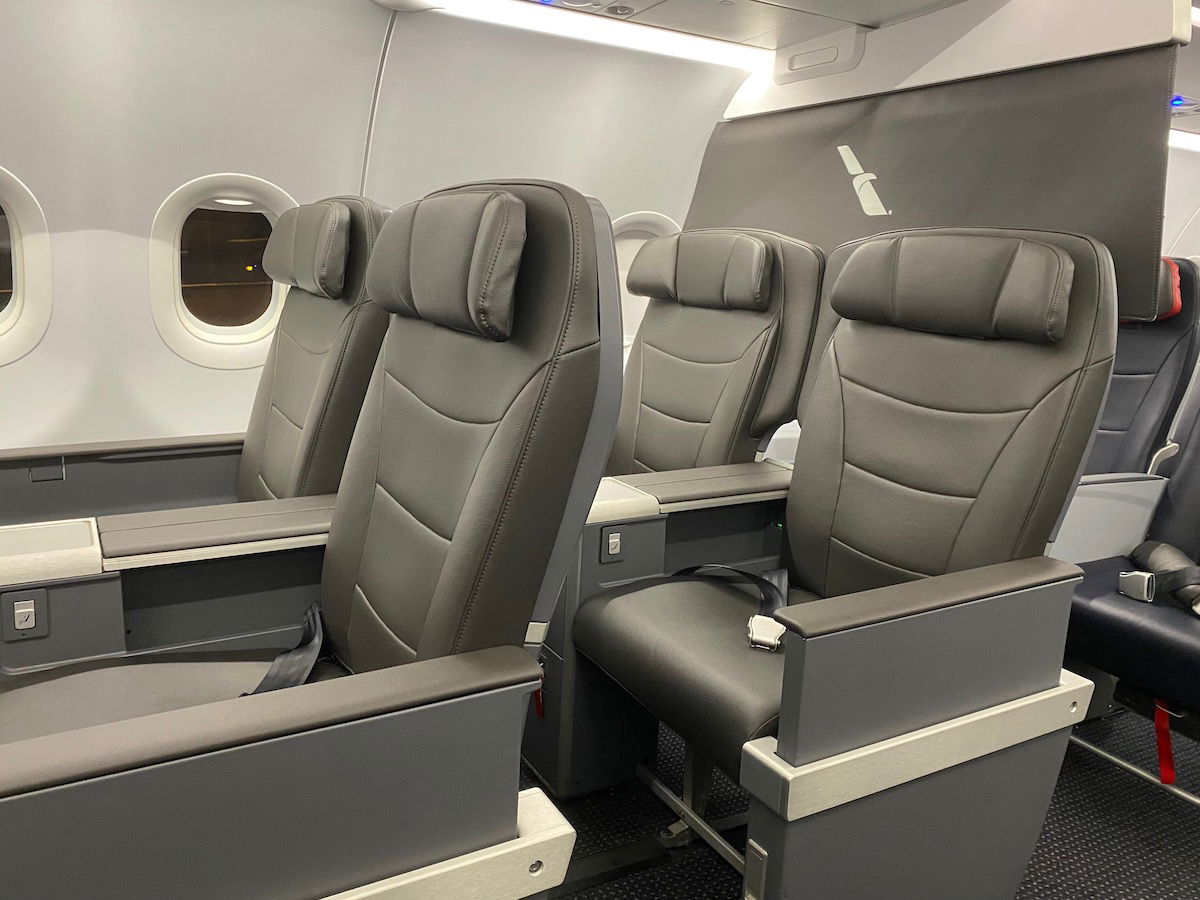
This lawsuit will set an interesting precedent
This isn’t the first time that Skiplagged is being sued by an airline. In 2014, United Airlines sued Skiplagged, but the case was thrown out because it was filed in Chicago, while Skiplagged’s owner lived in New York. Meanwhile Southwest sued Skiplagged in 2021, and reached a confidential settlement in June 2023. However, Southwest has long been more restrictive than other airlines when it comes to which agencies it allows to display its fares.
I’d argue the lawsuit with American is major:
- American does display its fares through most major online travel agencies
- Skiplagged is a lot different now than in 2014, when United sued the airline; back then it was basically a scrappy site with no business model that just helped consumers, while now the company charges a fee for helping people with hidden city ticketing
In some ways, this is no different than how American is blocking AwardWallet from helping AAdvantage members track their miles through some automated scripts.
As we increasingly see savvy online automation, we’ll likely see more and more of these kinds of cases. This essentially comes down to whether companies should be able to control who uses their websites and how. I don’t think American is being unreasonable here, even if I think this is anti-consumer. I’m curious to see how this plays out in court…
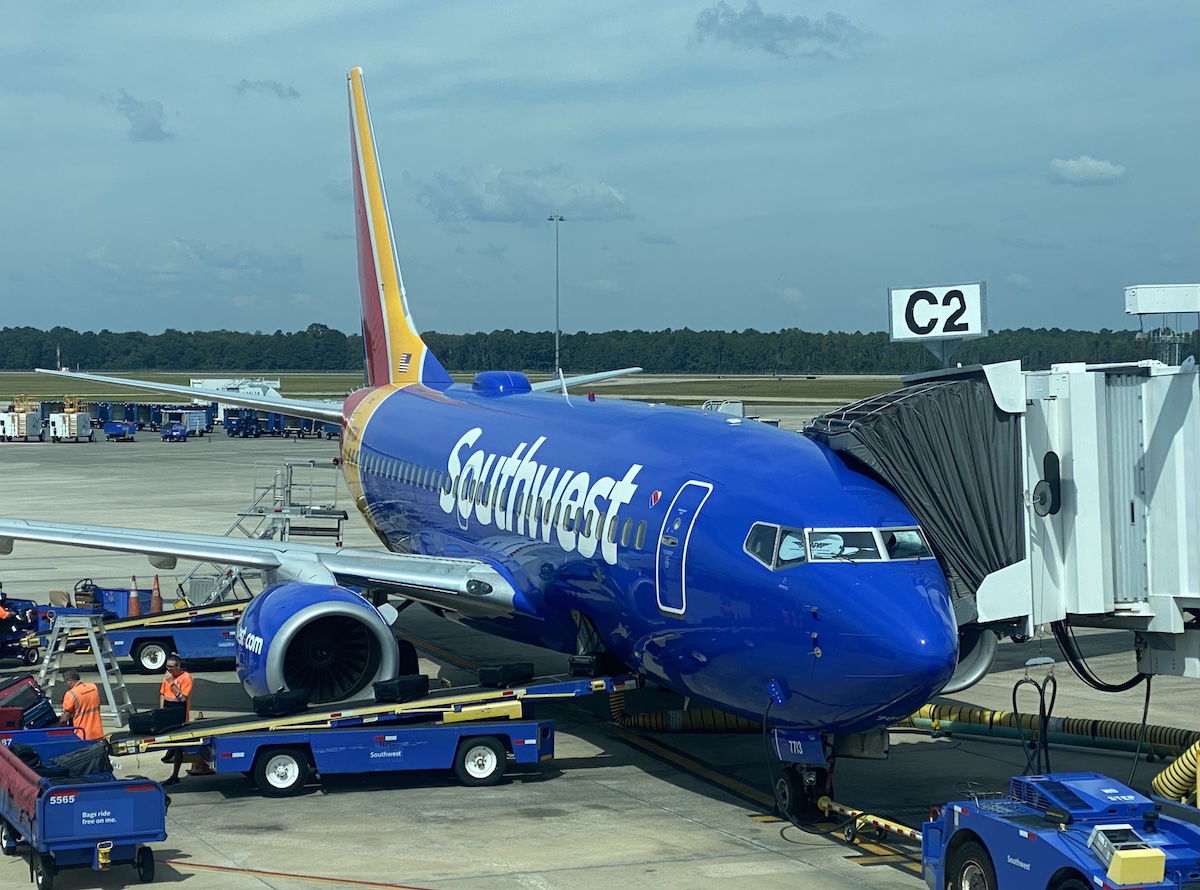
Bottom line
American Airlines is suing Skiplagged, a website that helps people engage in hidden city ticketing. This practice violates American’s contract of carriage, but isn’t illegal.
The gist of the lawsuit is that Skiplagged is using American’s website to book tickets in an automated way, in violation of American’s policy of not using its website “for any commercial purpose without American’s express authorization.” That’s a really broad accusation. It’ll be interesting to see how this plays out, because it could shape the future viability of Skiplagged.
What do you make of this lawsuit against Skiplagged?





The entire federal lawsuit will likely fail because it seems likely that the trademark and copyright claims will be dismissed because of either of two grounds, or both, and the federal court will decline to retain jurisdiction over the remaining state claims.
First, there is no trademark liability when there a sale of genuine goods bearing a true mark even if the sale is not authorized by the mark owner. Polymer Technology Corp. v. Mimran,...
The entire federal lawsuit will likely fail because it seems likely that the trademark and copyright claims will be dismissed because of either of two grounds, or both, and the federal court will decline to retain jurisdiction over the remaining state claims.
First, there is no trademark liability when there a sale of genuine goods bearing a true mark even if the sale is not authorized by the mark owner. Polymer Technology Corp. v. Mimran, 975 F.2d 58, 61 (2d Cir. 1992). “[E]ven repackaging of goods is not trademark infringement if it does not deceive the public or damage the mark owner’s goodwill.” Id. at 62. Although this case is about services rather than goods, the same principle applies. Skiplagged is selling genuine American Airlines transportation, and therefore is entitled to use the American Airlines mark to describe the services being sold, notwithstanding the fact that American Airlines has not authorized Skiplagged from doing so.
Second, under the nominative fair use doctrine, a person may use a third party’s mark without liability to refer to the owner of the mark or to their goods or services. That is, if there is no other way to describe the goods or services, other than by using the mark, then such mark usage is not infringement. See New Kids on the Block v Gannett Satellite Info Network, 971 F. 2d 302 (9th Cir 1992).
The copyright claim is novel. The copyright office had denied registration initially, and the court will likely be reluctant to give much protection to a logo by laws intended to protect creative writing. It seems reasonable that the same grounds for non-liability under trademark law will apply as well to this copyright claim.
With both types of federal claims—Lanham Act (trademark) and copyright—dismissed, the only remaining claims are Texas state claims brought to the federal court on supplemental and pendant jurisdiction. Especially because these state claims are completely separate from the trademark and copyright claims, the federal court will likely dismiss them as well, compelling American Airlines to go to a Texas court to pursue its state law claims.
That is all A/A can do go after the small guy. Skiplagged doing nothing wrong google flights Ita matrix orbits do the same thing sell back to back ticket I buy them all the time I am the wizard tech guy . I fly on any airline with my tickets never had any problem
The root of it is that airfares aren't based on the cost of the service. It makes zero sense that flying A to B to C costs less than just flying A to B.
I do agree that AA should be able to stop Skiplagged from collecting a fee to book the tickets on their site without permission.
So I want to fly from point B to point C. AA’s web site shows the flight is sold out so I have to book a less desirable flight. It turns out there were ten skiplagger’s booked on the flight with no intention of traveling to point C. The flight leaves with ten open seats one of which I could have been sitting it. I could think of lots of reasons why this practice should be stopped, this is just one example.
American and the other airlines are upset with this site because people buying there are doing no shows. By not boarding the last segment of your itinerary it is considered a last minute cancellation and that makes it almost impossible to sell the seat that is left empty. It is different than when someone cancels days in advance, as there the airline can re-sell the seat with no problem.
That seat was already "paid in full" by the person that no-showed. If anything, the airline should be happy - they got the revenue for the seat while incurring no expenses (fuel) for carrying the passenger. If the airline is able to accommodate a standby on that seat, that would just be the icing on the cake.
Granted, a carrier has the right to set terms for selling something, but I confess I don't understand why the airlines have an issue with skiplagging. If I buy something, I can choose to use it or not. How is the airline damaged? They still have the money from the original sale and additionally, an empty seat on a leg they can potentially fill for more money. If they didn't play games with their dynamic...
Granted, a carrier has the right to set terms for selling something, but I confess I don't understand why the airlines have an issue with skiplagging. If I buy something, I can choose to use it or not. How is the airline damaged? They still have the money from the original sale and additionally, an empty seat on a leg they can potentially fill for more money. If they didn't play games with their dynamic pricing and trying to squeeze every last penny out of passengers this might not happen.
They should have done this long ago. This is nothing new..
The more exorbitant the pricing differences, the greater the chance of skip-lagging.
Its a cat and mouse game.
With the grade inflation of loyalty programs, lack of upgrades, denied access to lounges, and worthless miles; some have little to lose.
They've got a hide getting angry about hidden city ticketing at all.
American is just too greedy in the business. Wanted to earn more money but do not want to bear the risk, and starting to target the small business and individuals and abusing the relatively vulnerable. I really hope the skipsomething would not lose the case. US certainly needs a Big 4 or 5 even 6.
I'm a bit surprised that Skiplagged actually purchases the tickets themselves. It feels like both they and the consumer would be better off (from legal and security standpoint) just charging a subscription fee (or their already existing service fee) for access to query for hidden ticket cities on their particular route.
Surely, anyone using that website to begin with is capable of booking their own ticket directly?
Airlines book cheaper A-B-C fares in order to compete with other airlines that fly A-C.
In this case, I assume American has the only non-stops to CLT from TPA. They charge for the privileged of flying non-stop. I assume Delta would fly to CLT from TPA via ATL. A longer flight. If this flight was for TPA-ATL, Delta would have the highest fare. The same would be true of United flying to MSY via...
Airlines book cheaper A-B-C fares in order to compete with other airlines that fly A-C.
In this case, I assume American has the only non-stops to CLT from TPA. They charge for the privileged of flying non-stop. I assume Delta would fly to CLT from TPA via ATL. A longer flight. If this flight was for TPA-ATL, Delta would have the highest fare. The same would be true of United flying to MSY via IAD from TPA.
I am aware of no airline that has a hub in MSY. Thus, all airlines will compete on price for this route that will go through someone's hub, especially if demand is slack. When there is equal competition in the sense that you will have to go through someone's hub to get to the destination and demand is lagging, the price comes down. I doubt the $92 TPA-MSY would be available during a Saints home game weekend.
What would be interesting in this study would be to see what Delta's and United's fares were TPA-CLT at this time.
Charging more for part of a ticket seems to fly in the face of cost accounting. However, in a deregulated environment. carriers compete. Airfares are still less, adjusted for inflation, than 35 years ago, when fares were fixed far higher than now and airlines competed on service.
An airline ticket is a contract of carriage. if the passenger is no longer intending to fulfill the contract, he or she should re-book with the revised itinerary.
Those who are gaming the system in this manner, aside from risking banishment from an airline, are putting the system of deregulation under stress. One outcome would be even higher fares TPA-MSY. during slack times. That would help no one, least of all the passengers who honestly want to fly to New Orleans but cannot afford much more than the $92 being offered.
And before someone starts accusing the airlines of price gouging, remember that they return about 5-8 cents of each dollar in sales to their shareholders. Like any business, they have to match prices with demand.
3 US airlines monopolize ~85% of all worldwide airline profit. AA is a behemoth scum and the largest of the too big to fails.
Good for Skiplagged! It's ridiculous that there are no more direct flights. Get rid of all these connecting flights!
That is idiotic. Do you realize that small airports rely on the “hub and spoke” system to connect to one another? Sure JFK-LAX will always have direct flights. But what about all the city pairs that can’t sustain direct flights?
This company also defrauds airlines outside the US and AA is not the only airline taking legal action. You realise all airlines globally offer connections via their respective hubs such as emirates, KLM, etihad, Singapore, Korean, Lufthansa, British airways.
You sound like a chicken
Not to mention some hotel chains allow big discounts to big businesses via corp codes
American will have no problem winning this lawsuit, and skiplagged will become just the latest in a long string of junk websites to fail. If you want to save money, fly Frontier, don't exploit loopholes.
Frontier? Lmao. Tell me you aren't a typical OMAT reader without telling me you aren't a typical OMAT reader.
F.. American. It's such a monopoly. They charge an insane amount of money for domestic flights. People want to save and need to save money. They should just have fair fares so that people wouldn't be skip lagging. It's idiotic you'd buy a longer ticket with a cheaper price when all you want to do is go to point B.
You're flying AA and it is YOU need to follow AA's rules, not other way around. It is irrelevant that your rules make sensor or not.
So do all OTAs have agreements with the airlines? I always kind of assumed they booked through an API that the airlines provided for general use (and that some airlines like Southwest don't provide). How does this actually work?
OTA uses GDS just like a traditional agent. To issue the ticket they gave the ticketing authority given by the airline. If they don’t behave well the airlines simply withdraw it and they cannot use the airline ticket stock.
Skiplagged should pivot to offer a subscription model (say, $10/month or $2 per day) for use of its website. Logos could easily be substituted for text or similar other logos. It should then just show the hidden city options with a link to the airline website (and let the consumer purchase tickets directly from there). Problem solved??
I have no ethical issue with the original function of Skiplagged; a geeky site that helped you find hidden city flights that you then needed to go to the airline site to book. The revenue was off advertising and clicks.
I do take issue with Skiplagged selling tickets. That’s about as legitimate as me going and buying lottery tickets and reselling them online.
Sounds like there is some merit to the suit, but at the same time the airline position on skiplagging is preposterous. If I want an empty seat next to me on a flight, I can buy one. Why shouldn’t I be allowed to buy a seat for a flight I’m not going to use at all too? Stop setting sneaky fares. For that matter why should airlines be able to sell more seats than they even have? The whole enterprise seems one like shady scams and voodoo pricing.
I had a light fixture globe that broke. I went to IKEA and bought a table lamp just to use its globe shade in my fixture.
Good thing IKEA isn't American Airlines.
American accuses Skiplagged of 'bait and switch.'
Thank goodness American's dynamic pricing has never raised a fare right in the middle of a user's flight search.
Pot meet kettle...
Ha! AA use "bait and switch" ALL the time. Their cheapest price is very rarely available and only becomes apparent after you've taken a few steps to book it. Pot kettle!
Query; whether AA sues all travel agents who would use AA.com to purchase a ticket for a client (personal or business), as their agent, and is compensated for their service? Are there not hundreds firms that manage corporate travel that use the AA site to purchase the tickets for their clients?
While I have no love lost for the random number generator that comes up with airfares, neither do I have much sympathy for people who cut every possible corner and then complain their circle isn't square enough.
It’s true it’s a violation of AA’s terms and conditions and using their logo and branding without permission. Third party companies must be aware they cannot use other companies logos without permission.
The enforceability of this sort of thing generally depends on whether the trademark holder can demonstrate that they diligently protect the mark. That's why you hear about silly cease and desist letters sent to kids operating a lemonade stand it whatever. If AA routinely allows their logic to be used by third parties they might not be able to defend the use by this particular third party.
Except if they have a licensing agreement with those 3rd parties. That may be seen by the court as enforcing their trademark because at AA’s sole discretion they choose who can use their trademark, when they can and, where they can.
Trademark infringement is defined as the unauthorized use of a trademark or service mark ***in a manner that is likely to cause confusion, deception, or mistake about the source of the goods and/or services.*** There is really no trademark infringement issue here because the services are still coming from AA.
IMO, tortious interference is AA's strongest legal argument here.
You write the following:
“ Specifically, the airline helps customers find hidden city ticketing opportunities, and then charges a service fee to direct people to booking these.”
No airline helps any passenger find hidden city ticketing opportunities. That is not correct. Perhaps you mean Skiplagged?